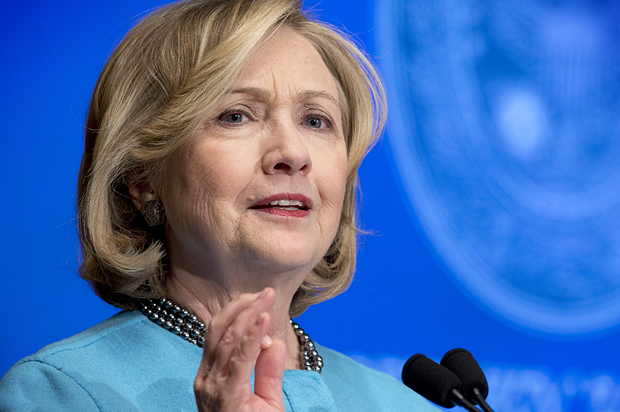THE CASH DONATIONS HILLARY SIMPLY HAS NO ANSWER FOR
The Clinton Foundation’s business relationship with 20 foreign governments raises real questions about her judgment VIDEO
David Sirota SALON.COM

Former Secretary of State Hillary Rodham Clinton speaks in Gaston Hall at Georgetown University in Washington, Wednesday, Dec. 3, 2014, about “Smart Power: Security Through Inclusive Leadership” as part of the launch of the inaugural National Action Plan Academy, a joint initiative of the Georgetown Institute for Women, Peace and Security, The Institute for Inclusive Security and the No Ceilings initiative of the Clinton Foundation. (AP Photo/Carolyn Kaster)
Hillary Clinton (Credit: AP/Carolyn Kaster)
Among all the rivers of money that have flowed to the Clinton family, one seems to raise the biggest national security questions of all: the stream of cash that came from 20 foreign governments who relied on weapons export approvals from Hillary Clinton’s State Department.
Federal law designates the secretary of state as “responsible for the continuous supervision and general direction of sales” of arms, military hardware and services to foreign countries. In practice, that meant that Clinton was charged with rejecting or approving weapons deals — and when it came to Clinton Foundation donors, Hillary Clinton’s State Department did a whole lot of approving.
While Clinton was secretary of state, her department approved $165 billion worth of commercial arms sales to Clinton Foundation donors. That figure from Clinton’s three full fiscal years in office is almost double the value of arms sales to those countries during the same period of President George W. Bush’s second term.
The Clinton-led State Department also authorized $151 billion of separate Pentagon-brokered deals for 16 of the countries that gave to the Clinton Foundation. That was a 143 percent increase in completed sales to those nations over the same time frame during the Bush administration. The 143 percent increase in U.S. arms sales to Clinton Foundation donors compares to an 80 percent increase in such sales to all countries over the same time period.
American military contractors and their affiliates that donated to the Clinton Foundation — and in some cases, helped finance speaking fees to Bill Clinton — also got in on the action. Those firms and their subsidiaries were listed as contractors in $163 billion worth of arms deals authorized by the Clinton State Department.
Under a directive signed by President Clinton in 1995, the State Department is supposed to take foreign governments’ human rights records into account when reviewing arms deals. Yet, Hillary Clinton’s State Department increased approvals of such deals to Clinton Foundation donors that her own agency was sharply criticizing for systematic human rights abuses.
As just one of many examples, in its 2011 Human Rights Report, Clinton’s State Department slammed Algeria’s government for imposing “restrictions on freedom of assembly and association,” tolerating “arbitrary killing,” “widespread corruption” and a “lack of judicial independence.”
That year, the Algerian government donated $500,000 to the Clinton Foundation and the next year Clinton’s State Department approved a one-year 70 percent increase in military export authorizations to the country. The jump included authorizations for almost 50,000 items classified as “toxicological agents, including chemical agents, biological agents and associated equipment.” The State Department had not authorized the export of any of such items to Algeria the year before.
advertisement
During Hillary Clinton’s 2009 Senate confirmation hearings, Republican Sen. Richard Lugar said the Clinton Foundation should stop accepting foreign government money. He warned that if it didn’t, “foreign governments and entities may perceive the Clinton Foundation as a means to gain favor with the secretary of state.”
The Clintons did not take his advice. Advocates for limits on the political influence of money now say that Lugar was prescient.
“The word was out to these groups that one of the best ways to gain access and influence with the Clintons was to give to this foundation,” said Meredith McGehee, policy director at the Campaign Legal Center.
While these arms deals may seem like ancient history, Lawrence Lessig, the director of Harvard University’s Safra Center for Ethics, says they “raise a fundamental question of judgment” — one that is relevant to the 2016 presidential campaign.
“Can it really be that the Clintons didn’t recognize the questions these transactions would raise?” he said. “And if they did, what does that say about their sense of the appropriate relationship between private gain and public good?”
David Sirota
David Sirota is a senior writer for the International Business Times and the best-selling author of the books “Hostile Takeover,” “The Uprising” and “Back to Our Future.” E-mail him at ds@davidsirota.com, follow him on Twitter @davidsirota or visit his website at www.davidsirota.com.







Follow Us!